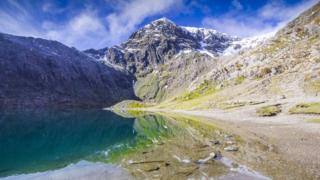Plastic pollution: Snowdon research is a 'wake-up call'
 Image copyright Getty Images
Image copyright Getty Images
The discovery of microplastic pollution near the top of the highest mountain in England and Wales is a "scary wake-up call", environmentalists have said.
Traces of plastic have been found in samples collected from Llyn Glaslyn - a remote lake near the summit of Snowdon.
The tiny particles are "most likely" to have been deposited by rain, wetland science expert Dr Christian Dunn said.
A teacher who gathered the samples will now visit all the UK's 15 national parks to learn more.
Activist Laura Sanderson swam 16 miles (26km) from the source of River Glaslyn - 2,000ft (610m) above sea level - to the sea, last April, collecting water samples along the way.
Results showed an average of three pieces of microplastic per litre from the lake made famous by Arthurian legend. The levels rose to eight per litre at the river's estuary at Porthmadog, Gwynedd.
However the full extent of the pollution is expected to be far worse.
The analysis, carried out at the School of Natural Sciences at Bangor University, was deliberately basic with scientists keen to find an easy-to-use method that is affordable for schools and colleges.
"The results are scary when you think that this is at the top of a mountain and a very remote location," said Dr Dunn, from Bangor University.
"However a more detailed analysis would almost certainly find more plastic.
"I should be surprised because it is so horrific, but sadly I'm not."
Scientists believe the microplastics - anything less than 5mm in size - and nano-plastics that are only visible under a microscope, are present in the air and rainfall.
Dr Dunn said this was the most likely cause of microplastic pollution on Snowdon, although particles released from litter breaking down could also be a factor.
"We don't know the full situation but this work will help address that," he said.
"However we have to wake up to the problem of how much plastic we use on a day-to-day basis.
"It's a valuable resource, especially for health care, but there are so many situations where plastic is completely unnecessary."
- 'No apparent risk’ from microplastics in water
- Why it's snowing plastic in the Arctic
- Microplastics in 'every studied animal'
Snowdonia National Park Authority said litter - particularly plastic bottles and wrappers - is a "real issue" and said teams of volunteer wardens collect nearly 400 bags of litter off the mountain each year.
Having highlighted the issue on Snowdon after braving snow and icy water temperatures, 38-year-old Laura, from Criccieth, Gwynedd, will now embark on a UK-wide 620-mile (1,000km) expedition.
Starting later this month, she will collect samples by swimming through rivers, lakes or coastlines of all 15 national parks, from the mountainous Cairngorms in the eastern Highlands of Scotland to the open plains of Dartmoor in Devon.
The challenge is expected to take up to a year to complete before scientists report on the results.
"We were horrified when we were told the water we'd collected [in Snowdonia] had microplastics in it," she said.
"So now we want to see just how widespread the problem is and look at waterways in all our national parks."
The research is backed by environmental organisation Surfers Against Sewage (SAS).
Charity chief executive Hugo Tagholm said Laura, by swimming, would provide a "unique opportunity" to collect water samples from hard-to-reach locations.
Source : BBC News - Science & Environment
Plastic pollution: Snowdon research is a 'wake-up call'
Plastic pollution: Snowdon research is a 'wake-up call'
